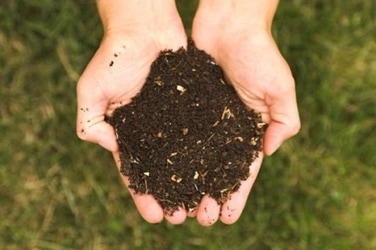Composting 101: What You Should and Shouldn’t Compost

The best gardeners know that compost is better than fertilizer, when it comes to providing a nutrient-rich growing environment for plants. Composting is easy and inexpensive, and anyone can do it. But for the best compost and composting experience, you need to put the best ingredients into your bin or pile. Here’s a quick list of what you should and should not compost, and why.
You SHOULD compost:
- Grass clippings
- Dead leaves and small twigs
- Wood chips and sawdust
- Fruits and vegetables
- Coffee grounds, filters, tea bags
- Cardboard rolls
- Dryer and vacuum cleaner lint
- Fireplace ashes
- House plants
- Nut shells
- Shredded newspaper
- Cotton and wool rags
You SHOULD NOT compost:
- Hay and straw
- Dairy products. They cause odor problems and can attract pests.
- Yard trimmings treated with pesticides. Chemicals might kill beneficial composting organisms.
- Coal or charcoal ash. Either could contain substances that are harmful to plants.
- Diseased or insect-ridden plants. These might survive the compost process only to be transferred back into your soil.
- Pet waste. It could contain parasites, bacteria, or germs harmful to humans.
- Meat scraps or fish bones. They cause odor problems and can attract pests.
- Black Walnut tree leaves or twigs. They release substances harmful to plants.
- Fat, grease, lard or oil. They cause odor problems and attract pests.
Photo: Greenupgrader.com
As a rule, your compost materials should be about 3 parts brown materials (leaves, twigs, woody plants) to 1 part green materials (kitchen scraps and lawn clippings). Also keep in mind that compost needs to stay warm (a sunny spot helps) and moist (keep it wet with the garden hose). It also needs air, so turning frequently will speed up the process. And here’s an experienced compost hobbyist’s tip: If you really want to compost quickly, put your kitchen scraps through the blender before adding them to your compost bin or pile. They’ll break down a lot faster.
Now go forth and make some dirt! For related content, consider:
Quick Tip: Compost
Bob Vila Radio: Composters
Natural Fertilizers and Non-Toxic Pesticides
You SHOULD compost:
- Grass clippings
- Dead leaves and small twigs
- Wood chips and sawdust
- Fruits and vegetables
- Coffee grounds, filters, tea bags
- Cardboard rolls
- Dryer and vacuum cleaner lint
- Fireplace ashes
- House plants
- Nut shells
- Shredded newspaper
- Cotton and wool rags
You SHOULD NOT compost:
- Hay and straw
- Dairy products. They cause odor problems and can attract pests.
- Yard trimmings treated with pesticides. Chemicals might kill beneficial composting organisms.
- Coal or charcoal ash. Either could contain substances that are harmful to plants.
- Diseased or insect-ridden plants. These might survive the compost process only to be transferred back into your soil.
- Pet waste. It could contain parasites, bacteria, or germs harmful to humans.
- Meat scraps or fish bones. They cause odor problems and can attract pests.
- Black Walnut tree leaves or twigs. They release substances harmful to plants.
- Fat, grease, lard or oil. They cause odor problems and attract pests.
Photo: Greenupgrader.com
As a rule, your compost materials should be about 3 parts brown materials (leaves, twigs, woody plants) to 1 part green materials (kitchen scraps and lawn clippings). Also keep in mind that compost needs to stay warm (a sunny spot helps) and moist (keep it wet with the garden hose). It also needs air, so turning frequently will speed up the process. And here’s an experienced compost hobbyist’s tip: If you really want to compost quickly, put your kitchen scraps through the blender before adding them to your compost bin or pile. They’ll break down a lot faster.
Now go forth and make some dirt! For related content, consider:
Quick Tip: Compost
Bob Vila Radio: Composters
Natural Fertilizers and Non-Toxic Pesticides
Boost Beneficial Bacteria w/Coke |
Coke can help improve your compost pile. Add one can of soda per week to your compost; the sugar in the cola feeds beneficial microorganisms, and the cola increases the acidity of the pile, helping material decay faster.
